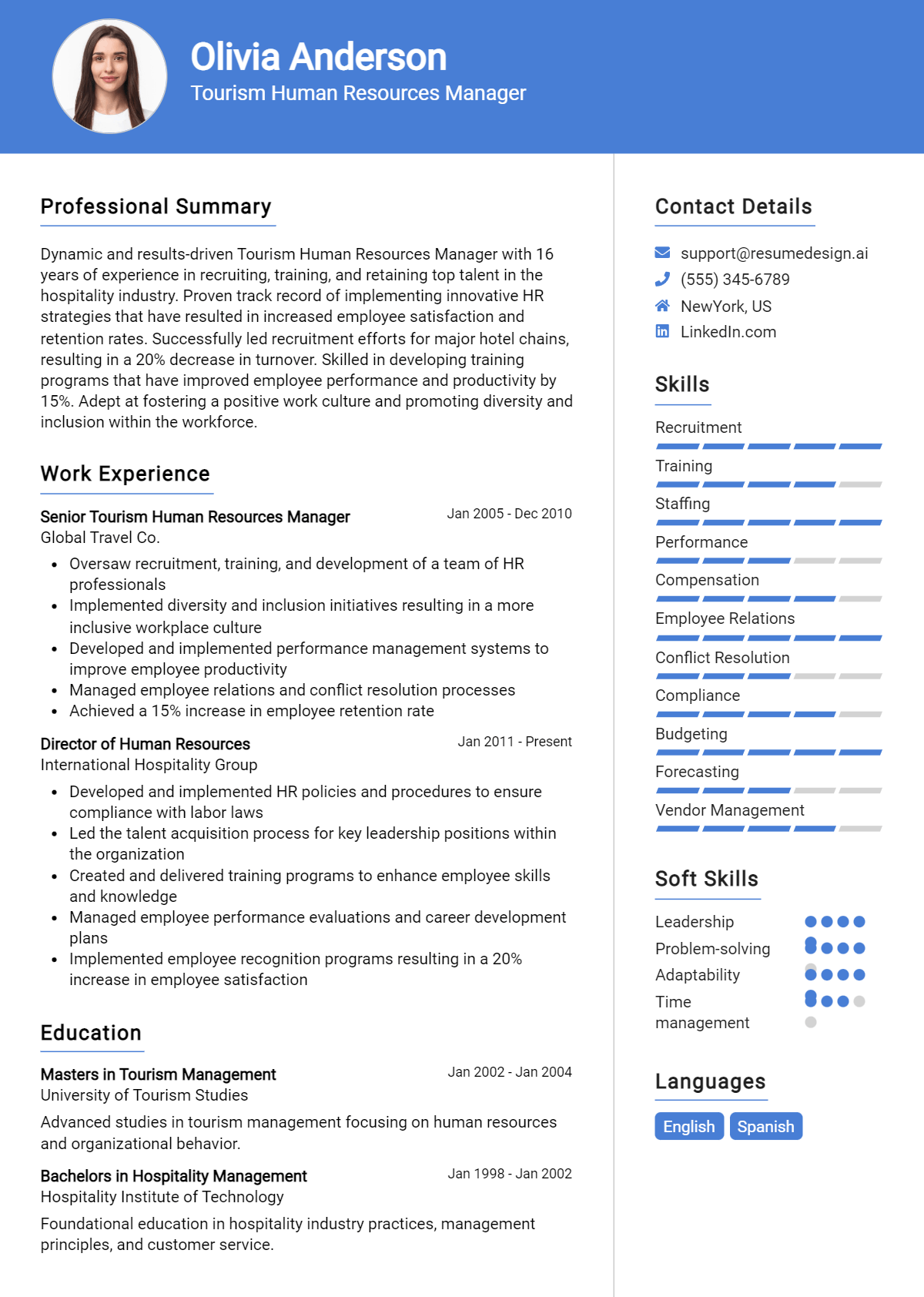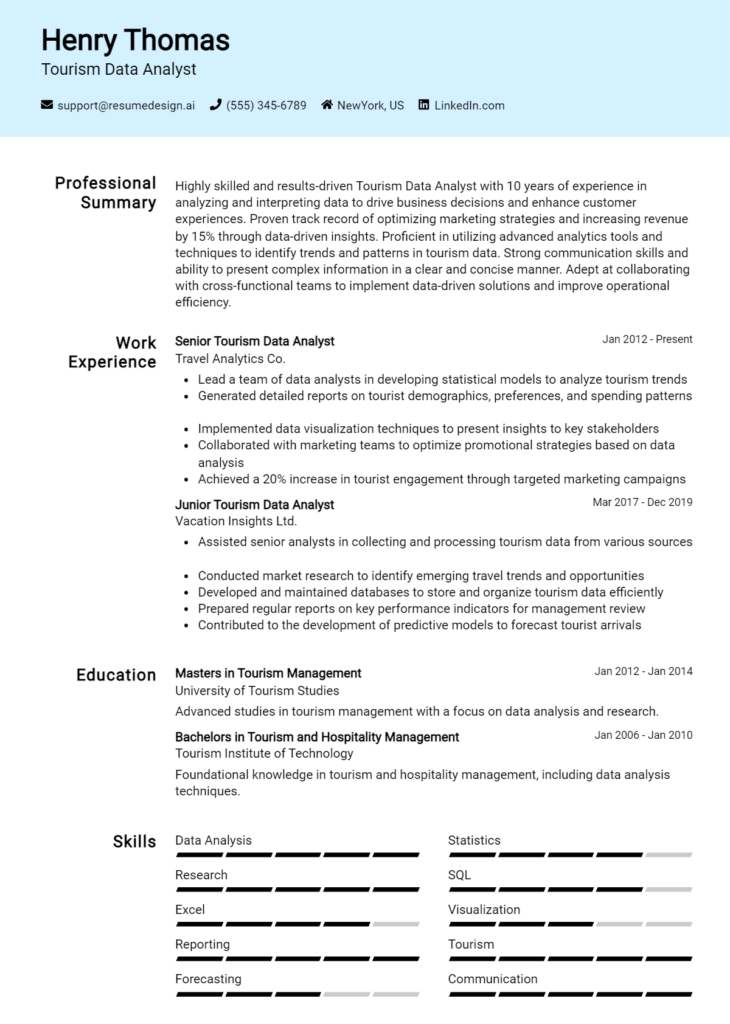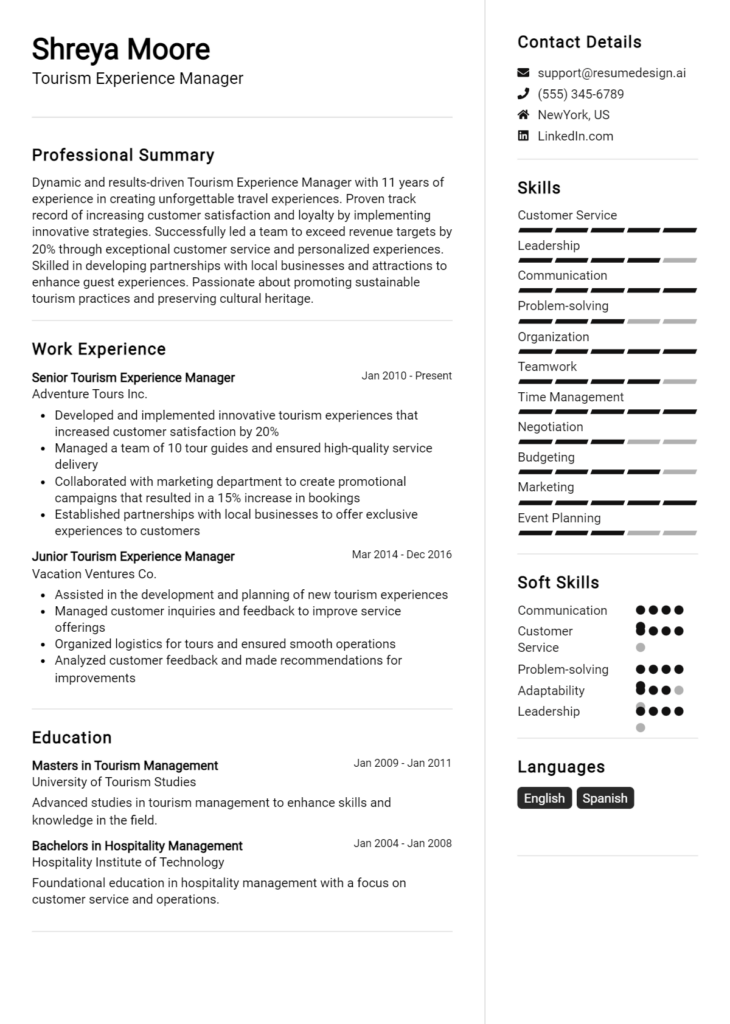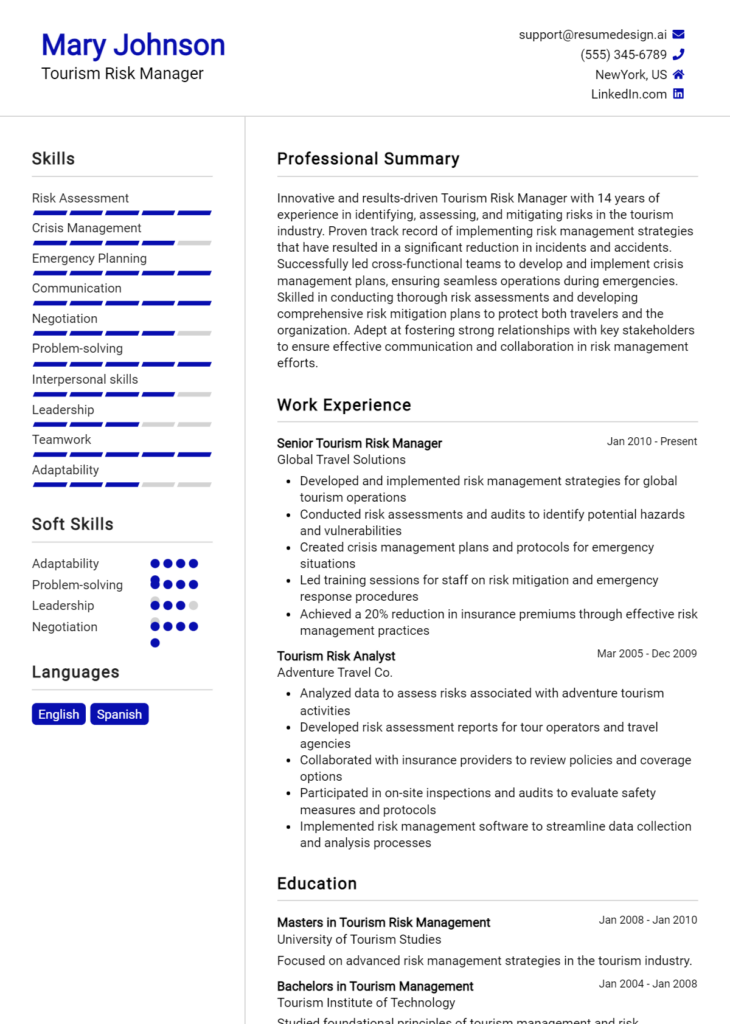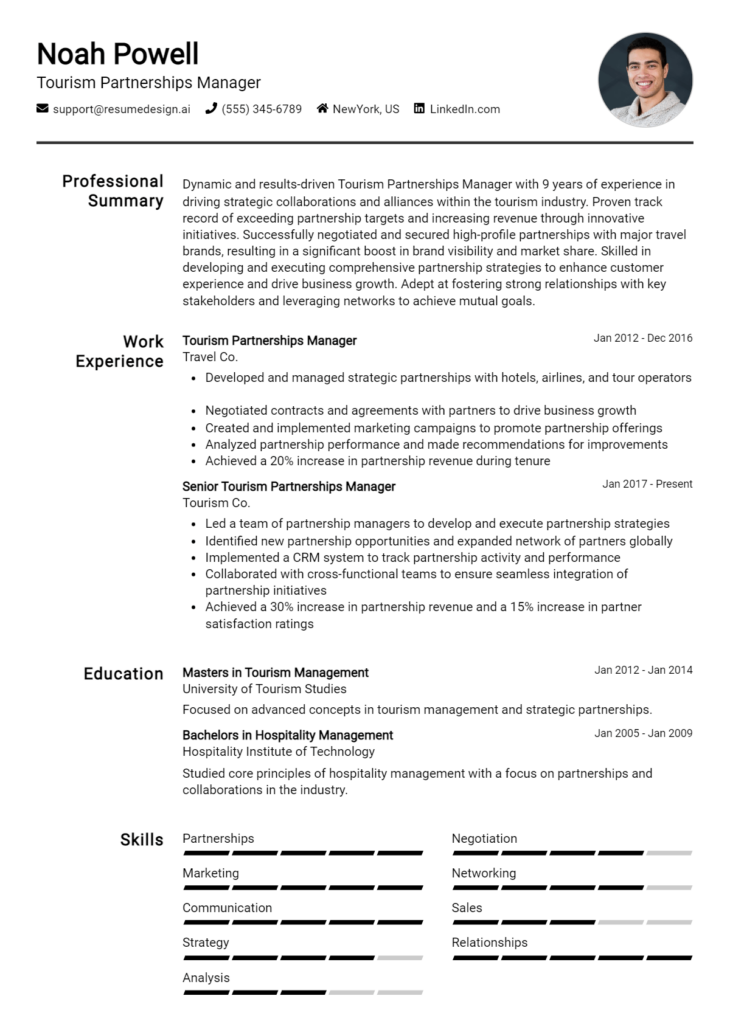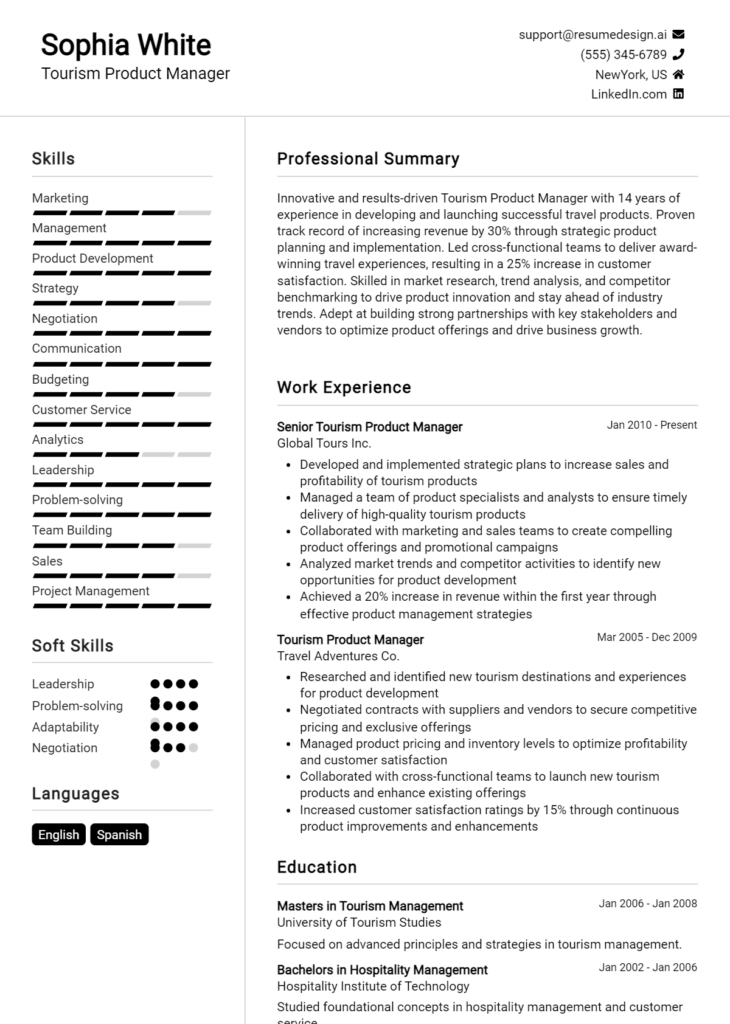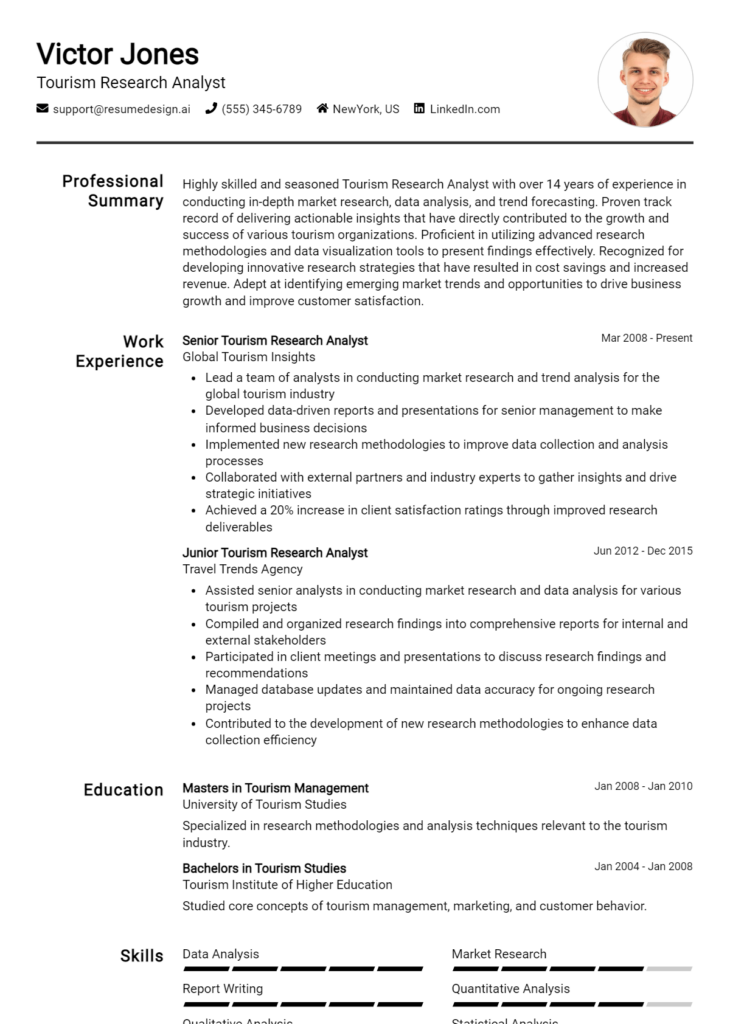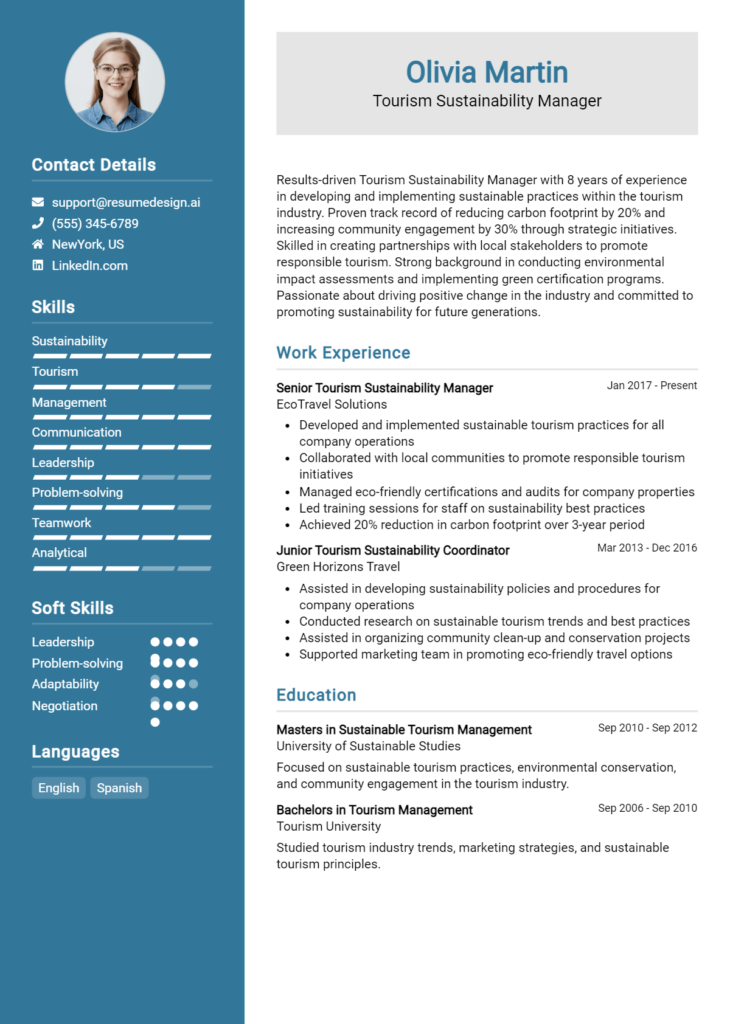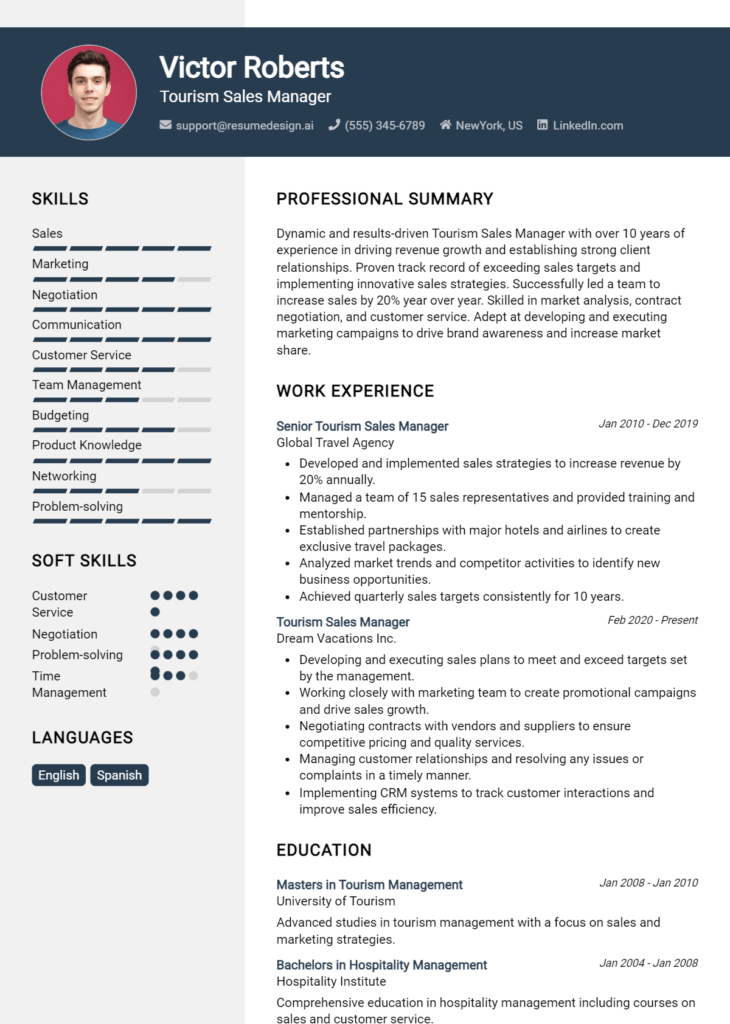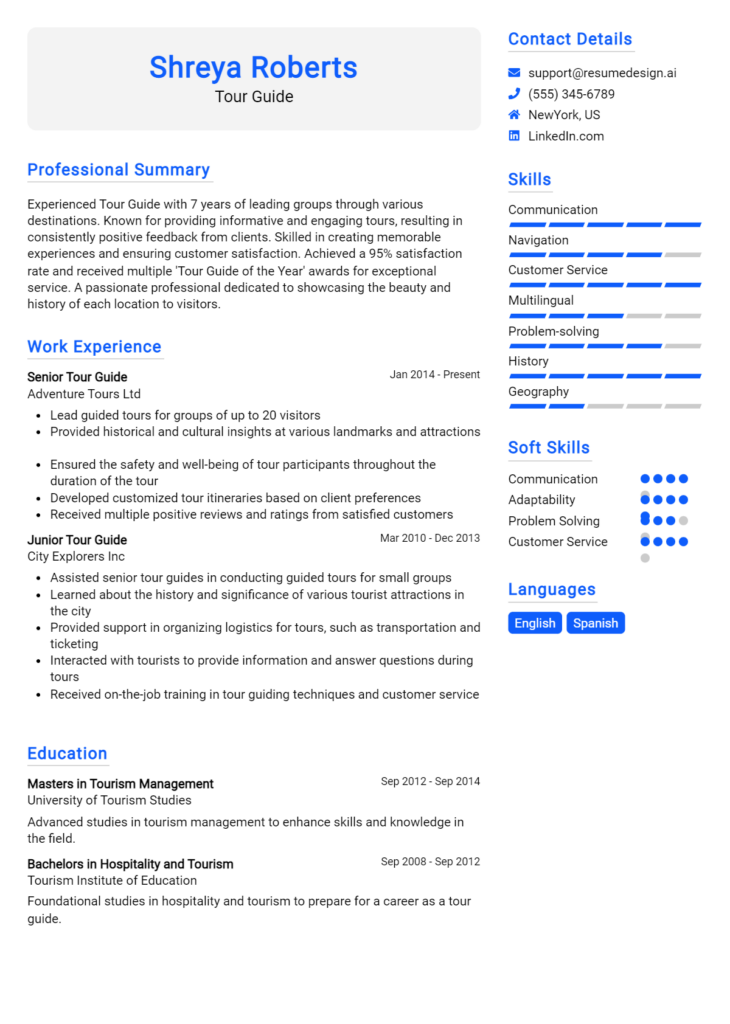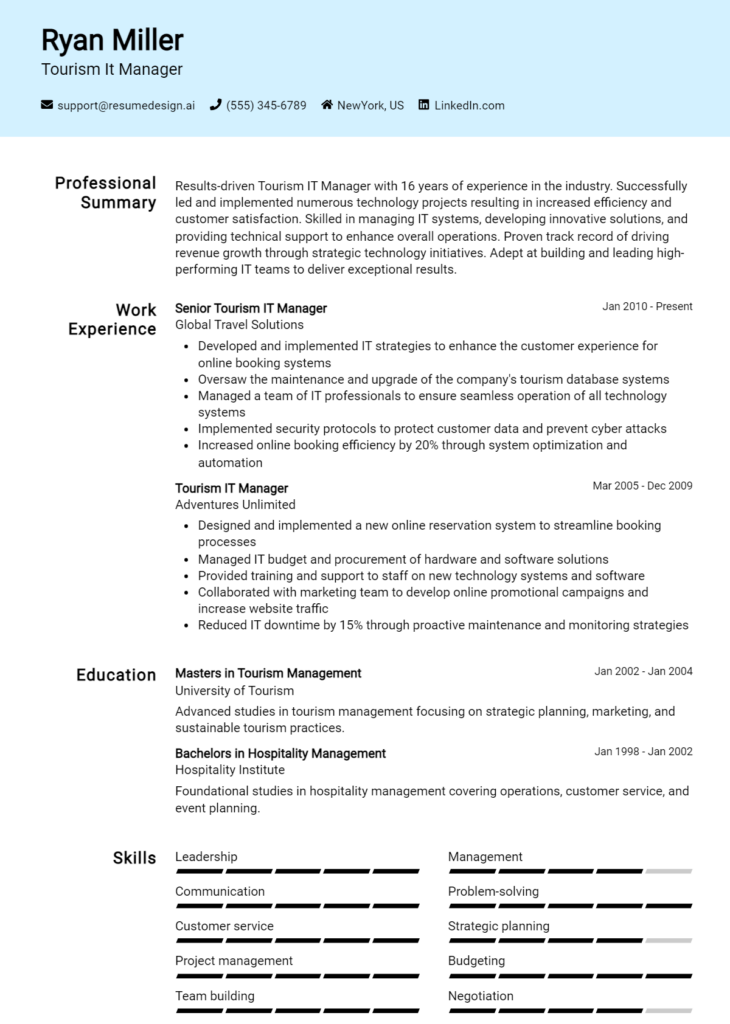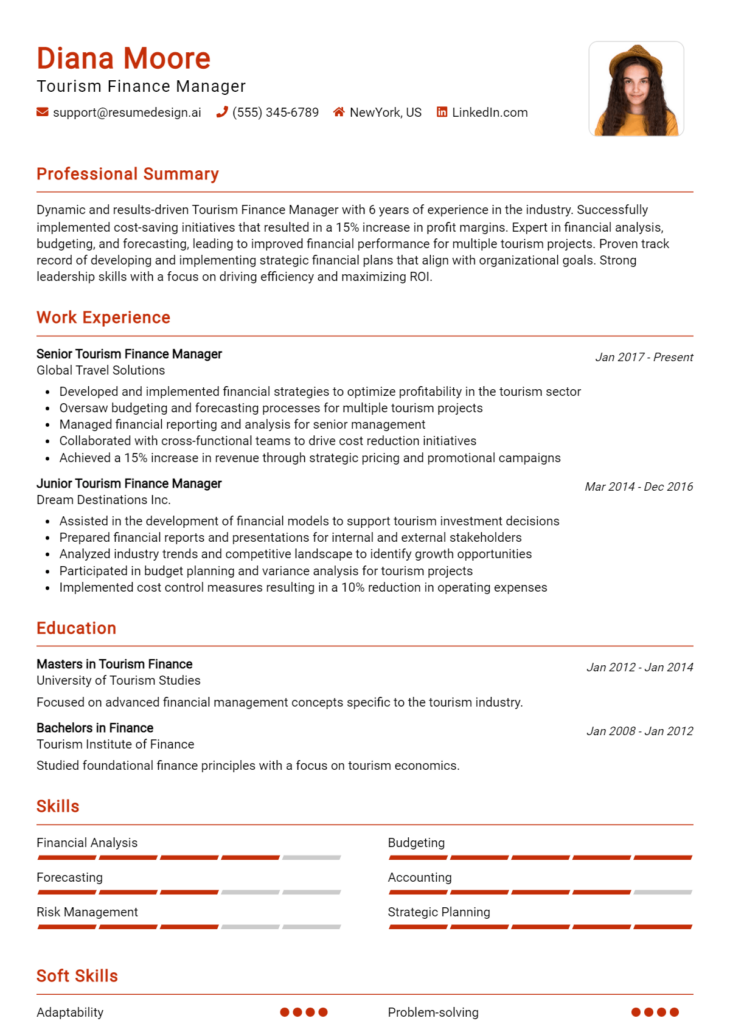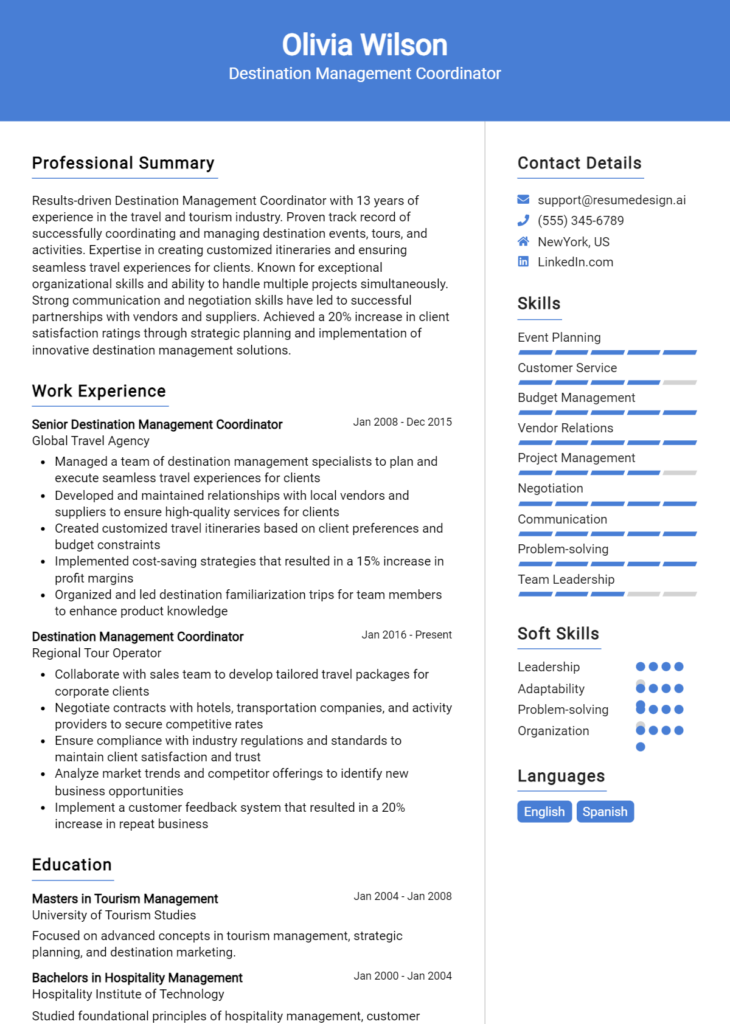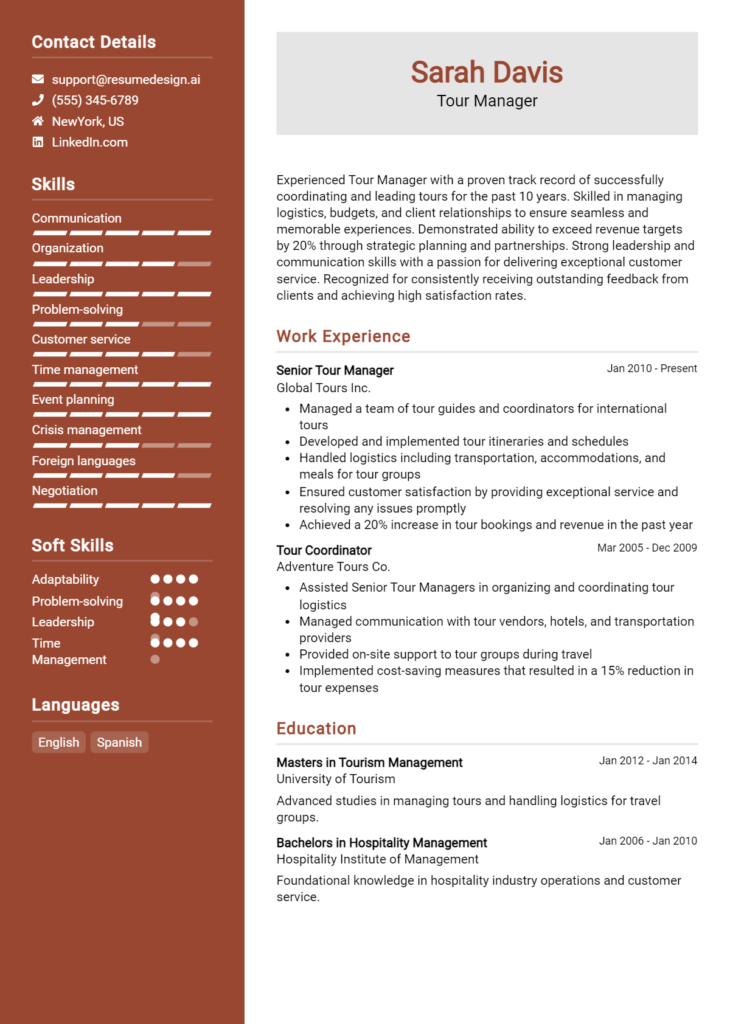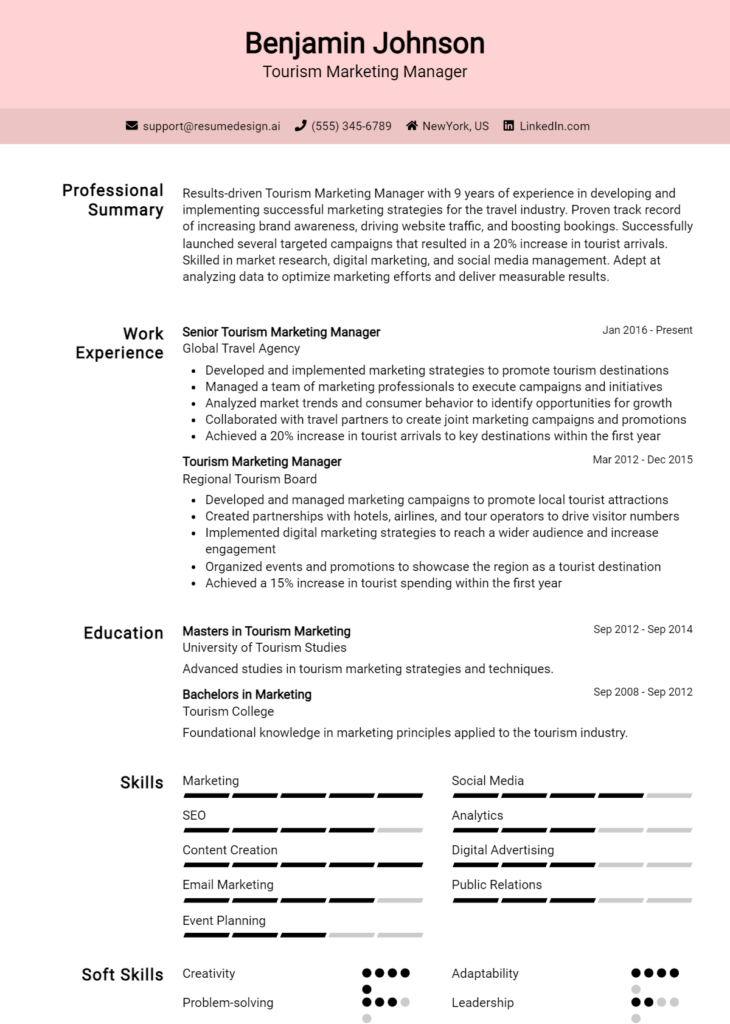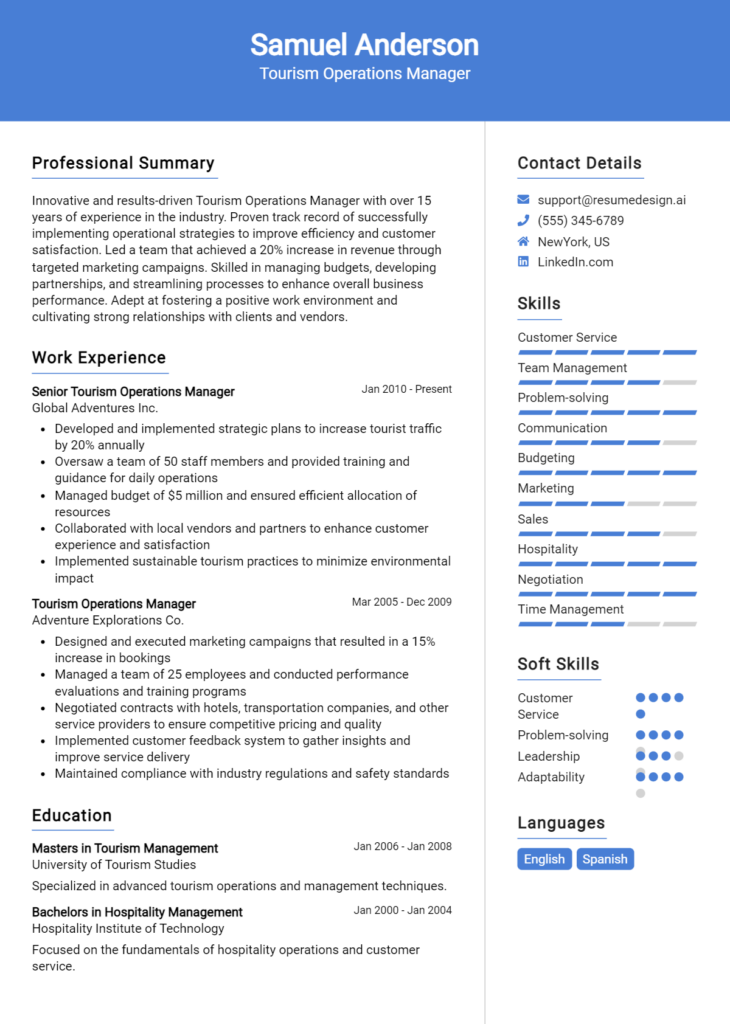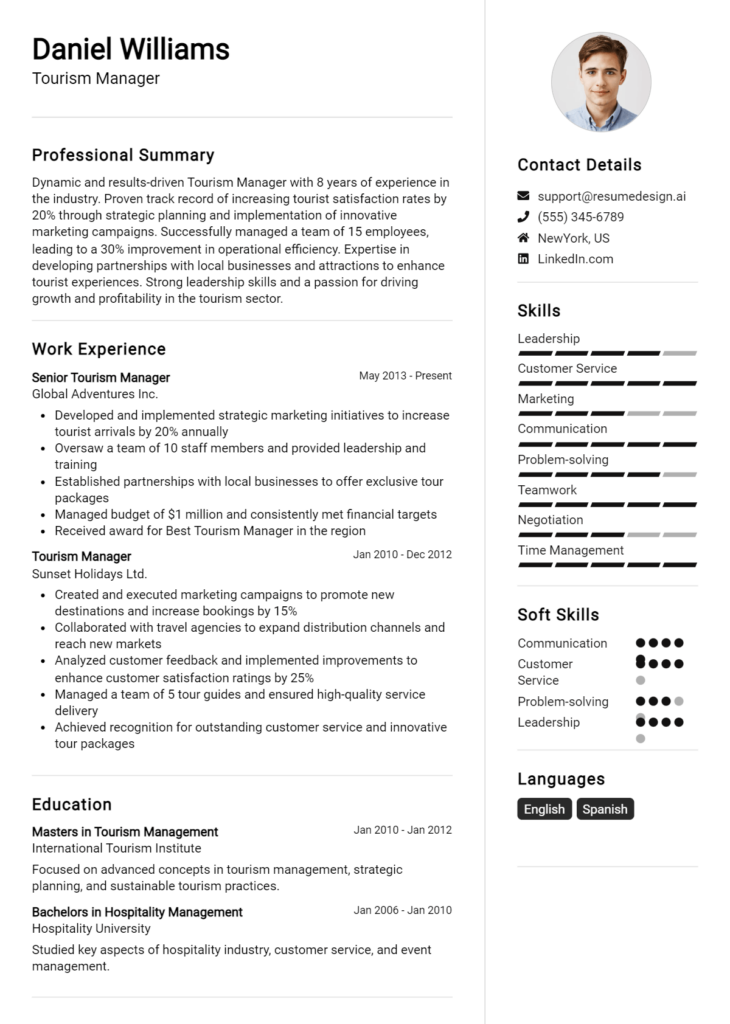Tourism Human Resources Manager Core Responsibilities
A Tourism Human Resources Manager plays a crucial role in bridging various departments within the organization, ensuring that recruitment, training, and employee satisfaction align with the company's goals. Key responsibilities include developing HR policies, managing talent acquisition, and fostering a positive work culture. Essential skills encompass technical expertise in HR systems, operational acumen, and strong problem-solving abilities. These competencies are vital for enhancing employee engagement and achieving organizational objectives. A well-structured resume effectively highlights these qualifications, showcasing a candidate's readiness to contribute to the tourism industry's success.
Common Responsibilities Listed on Tourism Human Resources Manager Resume
- Develop and implement effective recruitment strategies to attract top talent.
- Manage employee onboarding and training programs for new hires.
- Oversee performance management processes and employee evaluations.
- Ensure compliance with labor laws and industry regulations.
- Foster a positive workplace culture through employee engagement initiatives.
- Coordinate employee benefits and compensation programs.
- Address employee relations issues and mediate conflicts.
- Analyze workforce metrics to guide HR decision-making.
- Collaborate with department heads to align HR initiatives with business goals.
- Develop training programs tailored to the tourism sector's needs.
- Conduct exit interviews to gather insights for organizational improvement.
- Implement diversity and inclusion initiatives within the workplace.
High-Level Resume Tips for Tourism Human Resources Manager Professionals
In the competitive field of tourism, a well-crafted resume is crucial for Tourism Human Resources Manager professionals looking to make a lasting impression on potential employers. As the first point of contact in the hiring process, your resume needs to effectively showcase not only your qualifications and experiences but also your unique contributions to the industry. A compelling resume can set you apart from other candidates, reflecting your skills, achievements, and understanding of the tourism landscape. This guide will provide practical and actionable resume tips specifically tailored for Tourism Human Resources Manager professionals, ensuring you present yourself in the best possible light.
Top Resume Tips for Tourism Human Resources Manager Professionals
- Tailor your resume to the specific job description by incorporating keywords and phrases that align with the employer's needs.
- Highlight relevant experience in the tourism and hospitality sectors, emphasizing roles related to human resources management.
- Quantify your achievements with metrics, such as employee retention rates or successful training programs implemented.
- Showcase industry-specific skills, such as knowledge of labor laws, recruitment strategies, and conflict resolution.
- Include a summary statement at the top of your resume that encapsulates your career goals and key qualifications.
- Utilize action verbs to describe your responsibilities and accomplishments, making your contributions stand out.
- Keep the design clean and professional, ensuring easy readability with clear headings and bullet points.
- Incorporate any relevant certifications or training that enhance your qualifications in human resources management.
- Consider adding a section for professional affiliations or memberships in tourism and HR-related organizations.
- Proofread your resume meticulously to eliminate any grammatical errors or typos that could detract from your professionalism.
By implementing these tips, you can significantly increase your chances of landing a position in the Tourism Human Resources Manager field. A polished and targeted resume not only demonstrates your qualifications but also reflects your professionalism and commitment to the industry, making you a standout candidate in a crowded job market.
Why Resume Headlines & Titles are Important for Tourism Human Resources Manager
In the competitive field of tourism, where exceptional service and human connection are paramount, the role of a Tourism Human Resources Manager is critical. A well-crafted resume headline or title serves as the first impression a candidate makes on hiring managers, instantly summarizing their key qualifications in a compelling way. A strong headline grabs attention, highlighting the candidate's expertise and relevance to the role, enabling hiring managers to quickly assess their suitability. It should be concise, directly related to the job being applied for, and encapsulate the essence of the candidate's professional identity.
Best Practices for Crafting Resume Headlines for Tourism Human Resources Manager
- Keep it concise: Aim for no more than 10-15 words.
- Be role-specific: Tailor the headline to the Tourism Human Resources Manager position.
- Highlight key skills: Include critical HR and tourism-related competencies.
- Use action words: Start with dynamic verbs that convey impact.
- Incorporate measurable achievements: Mention specific accomplishments, if possible.
- Showcase relevant experience: Emphasize years of experience in HR or tourism.
- Avoid clichés: Steer clear of overused phrases that lack originality.
- Stay professional: Maintain a tone that reflects the seriousness of the role.
Example Resume Headlines for Tourism Human Resources Manager
Strong Resume Headlines
Dynamic Tourism HR Manager with 10+ Years of Experience in Talent Acquisition
Results-Driven Human Resources Leader Specializing in Employee Engagement in the Tourism Sector
Strategic HR Professional with Proven Track Record in Enhancing Staff Performance and Satisfaction
Weak Resume Headlines
HR Manager
Experienced Professional Looking for Opportunities
The strong headlines are effective because they clearly communicate the candidate's specific qualifications and experiences relevant to the role of a Tourism Human Resources Manager. They use impactful language and focus on measurable achievements, making them memorable. In contrast, the weak headlines fail to impress as they are vague and generic, lacking the detail and specificity needed to stand out in a competitive job market. By not conveying a clear professional identity or relevance to the role, they miss the opportunity to engage hiring managers effectively.
Writing an Exceptional Tourism Human Resources Manager Resume Summary
A resume summary is a critical component for a Tourism Human Resources Manager, as it serves as the first impression a hiring manager receives when reviewing an application. An exceptional summary quickly captures attention by showcasing the candidate's key skills, relevant experience, and notable accomplishments in the tourism industry. A strong summary is concise yet impactful, providing a snapshot of what makes the candidate uniquely qualified for the role. To be effective, it should be tailored specifically to the job description, ensuring that it resonates with the employer's needs and expectations.
Best Practices for Writing a Tourism Human Resources Manager Resume Summary
- Quantify achievements where possible to illustrate impact (e.g., "increased employee retention by 20% over two years").
- Focus on key skills relevant to the role, such as recruitment, employee relations, and compliance with labor laws.
- Tailor the summary to the specific job description by incorporating keywords and phrases from the posting.
- Highlight relevant certifications or training that enhance your qualifications (e.g., SHRM certification).
- Keep it concise—ideally, 2-4 sentences that capture your professional essence.
- Use action-oriented language to convey confidence and proactivity (e.g., "championed initiatives" or "developed training programs").
- Showcase industry-specific knowledge, such as understanding of tourism trends and challenges.
- Emphasize cultural competency and language skills if relevant to the position.
Example Tourism Human Resources Manager Resume Summaries
Strong Resume Summaries
Dynamic Tourism Human Resources Manager with over 8 years of experience in the hospitality sector, recognized for increasing employee retention rates by 25% through innovative training programs and engagement strategies. Proven track record in streamlining recruitment processes, resulting in a 30% reduction in hiring time while enhancing candidate quality.
Results-driven HR professional specializing in the tourism industry, with a robust background in compliance and employee development. Successfully implemented a performance management system that improved team productivity by 15% and fostered a culture of continuous improvement within a 200+ employee organization.
Dedicated Tourism Human Resources Manager with extensive experience in multicultural environments. Spearheaded initiatives that led to a 40% increase in employee satisfaction scores and maintained compliance with labor regulations across multiple locations, ensuring operational excellence.
Weak Resume Summaries
Human Resources Manager with some experience in tourism and hospitality. I have worked in various roles and am looking for a new opportunity.
Experienced HR professional seeking a position in tourism. I have a general understanding of HR practices and enjoy working with people.
The strong resume summaries are considered effective because they are specific, quantifiable, and directly relevant to the role of a Tourism Human Resources Manager. They highlight measurable achievements and clearly communicate the candidate's value. In contrast, the weak resume summaries lack detail and impact, failing to provide any concrete examples of accomplishments or skills that would make the candidate stand out to potential employers.
Work Experience Section for Tourism Human Resources Manager Resume
The work experience section of a Tourism Human Resources Manager resume is crucial as it not only highlights the candidate's technical skills but also demonstrates their ability to manage teams effectively and deliver high-quality products within the tourism sector. This section provides potential employers with insight into the candidate's hands-on experience and success in the field. By quantifying achievements and aligning experiences with industry standards, candidates can effectively showcase their value and relevance in the ever-evolving tourism landscape.
Best Practices for Tourism Human Resources Manager Work Experience
- Use specific metrics and statistics to quantify achievements, such as percentage increases in employee retention or reductions in turnover rates.
- Highlight technical skills relevant to the tourism industry, including recruitment software, HR analytics tools, and employee management systems.
- Demonstrate leadership capabilities by providing examples of successful team management and development initiatives.
- Include collaborative projects that showcase working with cross-functional teams, underscoring the ability to liaise between departments.
- Tailor work experience to reflect industry standards and terminologies that resonate with hiring managers in the tourism sector.
- Focus on results-driven narratives that illustrate how strategies implemented improved organizational performance.
- Utilize action verbs to convey a sense of initiative and proactivity in roles undertaken.
- Incorporate relevant certifications or training that enhance professional credibility in the tourism HR domain.
Example Work Experiences for Tourism Human Resources Manager
Strong Experiences
- Successfully implemented a new onboarding program that reduced training time by 25%, leading to a 15% increase in employee satisfaction scores.
- Led a team of 10 HR professionals in a recruitment campaign that filled 200 positions within three months, achieving a 95% retention rate for new hires within the first year.
- Developed and executed a diversity hiring initiative that increased minority representation in the workforce by 30%, aligning with industry best practices.
- Collaborated with departmental heads to create a performance management system that improved employee productivity by 20%, resulting in enhanced service delivery.
Weak Experiences
- Responsible for various HR tasks in a tourism company.
- Assisted in hiring processes without measurable outcomes or specific contributions.
- Participated in team meetings and offered ideas occasionally.
- Handled employee complaints as needed with no documented resolutions or improvements.
The examples classified as strong demonstrate clear, quantifiable outcomes, showcasing leadership and effective collaboration that align with the expectations of a Tourism Human Resources Manager. In contrast, the weak experiences lack specificity and measurable achievements, making it difficult for potential employers to gauge the candidate's impact or effectiveness in their roles. Strong experiences convey a proactive and results-oriented approach, while weak experiences fail to illustrate meaningful contributions to the organization.
Education and Certifications Section for Tourism Human Resources Manager Resume
The education and certifications section of a Tourism Human Resources Manager resume plays a critical role in showcasing the candidate's academic background and commitment to professional development. This section not only highlights relevant degrees and industry-recognized certifications but also reflects the candidate's continuous learning efforts in a dynamic field. By providing details on relevant coursework, specialized training, and certifications, candidates can significantly enhance their credibility and demonstrate their alignment with the specific requirements of the role. A well-structured education and certifications section can set a candidate apart in a competitive job market, illustrating their preparedness to manage human resources effectively within the tourism sector.
Best Practices for Tourism Human Resources Manager Education and Certifications
- Prioritize relevant degrees in fields such as Human Resources, Business Administration, or Tourism Management.
- Include industry-recognized certifications like SHRM-CP, PHR, or certifications specific to tourism and hospitality.
- Highlight any specialized training related to HR practices in the tourism industry.
- List relevant coursework that aligns with the skills and knowledge required for the role.
- Ensure that all listed qualifications are current and reflect the latest industry standards.
- Use clear and concise language to describe each credential, focusing on its relevance to the job.
- Consider including professional development workshops or seminars attended in the tourism field.
- Keep the section organized and visually appealing, ensuring easy readability for recruiters.
Example Education and Certifications for Tourism Human Resources Manager
Strong Examples
- Bachelor of Science in Human Resource Management, University of XYZ, 2018
- Certified Professional in Human Resources (PHR), HR Certification Institute, 2020
- Certificate in Hospitality Management, ABC Institute, 2019
- Relevant Coursework: Employee Relations, Organizational Behavior, and Labor Laws in Tourism
Weak Examples
- Bachelor of Arts in Fine Arts, University of ABC, 2015
- Certification in Basic First Aid, Red Cross, 2017
- Diploma in Office Administration, XYZ College, 2014
- Relevant Coursework: Art History and Painting Techniques
The strong examples listed demonstrate a clear alignment with the requirements and responsibilities of a Tourism Human Resources Manager, showcasing relevant degrees and certifications that enhance the candidate's qualifications. In contrast, the weak examples reflect educational qualifications and certifications that lack relevance to the tourism and HR fields, which may diminish the candidate's overall appeal to potential employers. By focusing on pertinent credentials, candidates can better position themselves as suitable contenders for the role.
Top Skills & Keywords for Tourism Human Resources Manager Resume
In the dynamic field of tourism, a Human Resources Manager plays a pivotal role in ensuring that an organization attracts, retains, and develops top talent to provide exceptional service to travelers. A well-crafted resume showcasing relevant skills is essential for standing out in this competitive industry. The right combination of hard and soft skills not only demonstrates a candidate's qualifications but also reflects their ability to adapt to the unique challenges of the tourism sector. From effective communication to strategic planning, these skills highlight the capacity to foster a positive workplace culture and enhance employee engagement. For those looking to enhance their resumes, focusing on skills that align with the demands of the tourism industry is crucial, as is detailing relevant work experience that showcases these competencies.
Top Hard & Soft Skills for Tourism Human Resources Manager
Soft Skills
- Excellent communication skills
- Interpersonal skills
- Problem-solving abilities
- Team leadership
- Cultural sensitivity
- Adaptability and flexibility
- Conflict resolution
- Emotional intelligence
- Customer service orientation
- Strategic thinking
Hard Skills
- Knowledge of labor laws and regulations
- Recruitment and talent acquisition
- Employee training and development
- Performance management
- HR software proficiency
- Compensation and benefits administration
- Policy development and implementation
- Data analysis and reporting
- Project management
- Budgeting and financial management
Stand Out with a Winning Tourism Human Resources Manager Cover Letter
As a dedicated Human Resources professional with over seven years of experience in the tourism and hospitality industry, I am excited to apply for the Tourism Human Resources Manager position at your esteemed organization. My background in recruitment, employee development, and performance management aligns perfectly with your company's commitment to delivering exceptional customer experiences. I am passionate about fostering a positive workplace culture that attracts top talent and encourages employee engagement, essential components for driving the success of any tourism-related enterprise.
In my previous role as HR Manager at XYZ Resorts, I successfully implemented a comprehensive talent acquisition strategy that increased our staff retention rate by 30% over two years. By developing robust training programs and mentorship initiatives, I ensured that employees were not only skilled but also motivated to excel in their roles. My ability to cultivate strong relationships with management and staff alike has allowed me to bridge the gap between organizational goals and employee aspirations, creating an environment where everyone feels valued and empowered to contribute to the company's success.
I am particularly drawn to your organization due to its reputation for innovation in the tourism sector and its commitment to sustainability and community engagement. I am eager to bring my expertise in creating inclusive hiring practices and developing employee wellness programs that align with your mission. I believe that a strong organizational culture rooted in diversity and respect is vital for attracting a diverse clientele and enhancing overall guest satisfaction. I am excited about the opportunity to contribute to your team and help shape a workforce that reflects your values and vision.
Thank you for considering my application for the Tourism Human Resources Manager position. I am looking forward to the possibility of discussing how my skills and experiences can contribute to the continued success of your company. I am eager to bring my passion for HR and tourism together to create an exceptional workplace that not only meets but exceeds the expectations of both employees and guests alike.
Common Mistakes to Avoid in a Tourism Human Resources Manager Resume
When applying for a position as a Tourism Human Resources Manager, crafting a resume that stands out is crucial. However, many candidates make common mistakes that can overshadow their qualifications and experiences. Understanding these pitfalls can help you create a more effective resume that highlights your skills and suitability for the role in the tourism industry. Here are some common mistakes to avoid:
Generic Objective Statement: Using a one-size-fits-all objective can make your resume feel impersonal and unfocused. Tailor your statement to reflect your passion for tourism and HR, detailing what you bring to the specific role.
Lack of Quantifiable Achievements: Failing to include measurable accomplishments can weaken your resume. Instead of stating your responsibilities, quantify your impact, for example, “Increased employee retention by 20%.”
Ignoring Industry-Specific Keywords: Not incorporating relevant keywords from the job description can lead to your resume being overlooked by applicant tracking systems. Research industry terminology and integrate them naturally into your resume.
Overloading with Irrelevant Experience: Including unrelated work experience can dilute your qualifications. Focus on positions that highlight your HR skills and tourism knowledge, and consider omitting less relevant roles.
Poor Formatting and Layout: A cluttered or difficult-to-read resume can turn off hiring managers. Use a clear layout, consistent fonts, and ample white space to ensure your resume is visually appealing and easy to navigate.
Neglecting Soft Skills: While technical HR skills are important, tourism roles often require strong interpersonal skills. Make sure to showcase your communication, conflict resolution, and team-building abilities.
Failure to Customize for Each Application: Sending out a generic resume for multiple applications can hinder your chances. Customize your resume for each job by highlighting the most relevant experiences and skills that align with the specific role.
Excessive Length: A lengthy resume can overwhelm hiring managers. Aim to keep your resume concise, ideally one page, while still providing enough detail to showcase your qualifications effectively.
Conclusion
As a Tourism Human Resources Manager, your role is pivotal in fostering a positive workplace culture while ensuring that the recruitment process aligns with the unique needs of the tourism industry. Throughout this article, we've explored essential skills such as talent acquisition, employee engagement, and compliance with labor laws. We also discussed the importance of developing training programs tailored to the diverse workforce in tourism, as well as strategies for enhancing staff retention through effective communication and leadership.
In conclusion, it's crucial to reflect on your qualifications and experiences in this dynamic field. Take the time to review your resume to ensure it highlights your expertise and aligns with the expectations of potential employers. To assist you in this process, consider utilizing valuable resources such as resume templates, an intuitive resume builder, comprehensive resume examples, and tailored cover letter templates. These tools can help you create a standout application that captures your strengths as a Tourism Human Resources Manager. Don’t miss the opportunity to present your best self to future employers!

